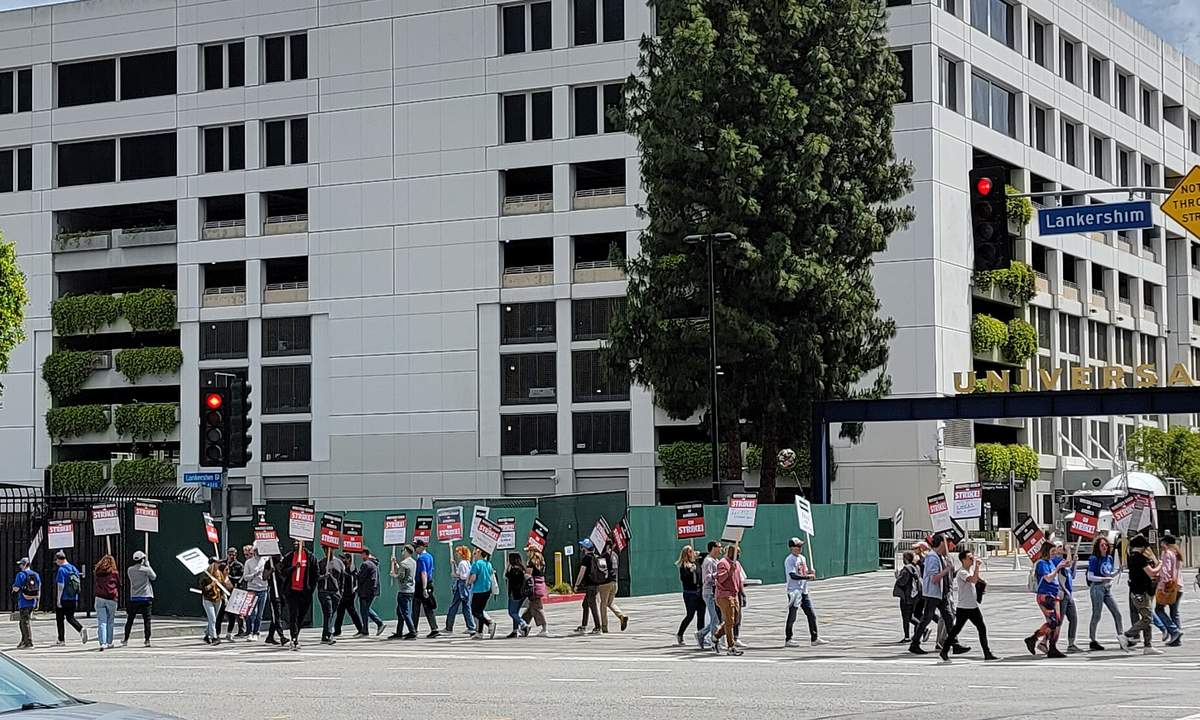Hollywood, California —(Map)
Last Tuesday, writers of movies and TV shows in the United States went on strike for a better working agreement. Many of the writers’ concerns are caused by the growth of streaming services like Netflix and Amazon. The strike could affect many TV shows and movies.
The Writers Guild of America (WGA) announced its strike last week after talks broke down between the writers and the studios – the companies that make TV shows and movies.*
The WGA represents about 11,500 people who write scripts for TV and movies. The group is fighting for more money for writers, and for changes in the way the studios work with writers.

(Source: David James Henry [CC BY-SA 4.0], via Wikimedia Commons.)
The last time TV and movie writers went on strike was 2007. The strike lasted for 100 days and cost over $2 billion.
Roughly 15 years have passed since that strike. Since then, the business of making and selling TV shows and movies has changed completely. That’s because of the rapid rise of internet-based streaming services.
In the past, most US TV shows came either from big TV networks like NBC, CBS, and ABC, or from cable channels. Most shows began in September and ran until summer. A show might have had 20 or more episodes in a season.
Studios would hire lots of writers to work together all year to create the scripts for these shows. Writers would get paid for their work, and would usually get paid again if the series was shown again.
😕
This image has not been loaded because of your cookie choices. To view the content, you can accept 'Non-necessary' cookies.
Many of the writers’ concerns are caused by the growth of streaming services like Netflix and Amazon. Studios used to hire lots of writers for a long time. Now, with streaming services, new shows come out all the time, and studios are hiring fewer writers for shorter periods of time.
Now, with streaming services, new shows come out all the time. Often, a “season” might only have eight episodes. Studios are hiring fewer writers for shorter periods of time. And writers aren’t usually paid when shows are replayed. Many TV and movie writers don’t make enough money to live on.
Writers are also worried about Artificial Intelligence (AI). AI tools have recently gotten much, much better at writing. AI tools can even come up with clever ideas for stories.
The WGA wants studios to promise to hire more writers for their shows, and pay them when the shows get replayed. They also want the studios to promise not to replace writers with AI tools.
The studios say they have offered writers more money, but they can’t meet all of the WGA’s demands. Many studios say their streaming services have been losing money. As a result, studios are looking for ways to save money. That may mean using fewer writers or exploring AI tools.
😕
This image has not been loaded because of your cookie choices. To view the content, you can accept 'Non-necessary' cookies.
Most shows are recorded far in advance, so it could take a while for viewers to notice the effects of the strike. But work on many shows has stopped, and if the strike goes on for long, the numbers will grow. The strike will also affect all the other workers who help make TV shows and movies.
Most shows are recorded far in advance, so it could take a while for viewers to notice the effects of the strike. But live TV shows will be affected quickly. Some late night shows are already showing reruns.
Work on many other shows has stopped. And if the strike goes on for long, the numbers will grow. Without new scripts, shows won’t be able to film new episodes.
This will also affect other workers who help make TV shows and movies. As many as 20,000 people could soon be out of a job. That could cause serious problems for all kinds of businesses in places like Hollywood.
* The studios are being represented by the AMPTP (Alliance of Motion Pictures and Television Producers).
Check Yourself
0/4
1. Writers of movies and TV shows in the US went on strike last week for a better working agreement.
True False2. The Writers Guild of America represents about ____________ people who write scripts for TV and movies.
3. What is one of the main causes for the writers' concerns?
4. In the past, a TV show season might have had __________ or more episodes.
If you were in charge, how would you settle the disagreement? What do you think might be a fair solution for both writers and studios?
😕
This map has not been loaded because of your cookie choices. To view the content, you can accept 'Non-necessary' cookies.
